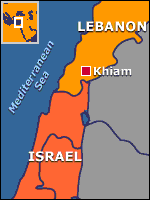The recent tragedy of war in Lebanon has spurred Americans, as well as people from  Israel and Lebanon, to turn to the Internet for support. Groups of bloggers are publishing their struggles online. These posts serve many purposes: providing a point of contact with family and friends, keeping others informed about what exactly is going on in daily life in the Middle East, and giving people from all over the world an accurate picture of the daily struggle faced by those in Lebanon and Israel.
Israel and Lebanon, to turn to the Internet for support. Groups of bloggers are publishing their struggles online. These posts serve many purposes: providing a point of contact with family and friends, keeping others informed about what exactly is going on in daily life in the Middle East, and giving people from all over the world an accurate picture of the daily struggle faced by those in Lebanon and Israel.
The Lebanese Blogger Forum aggregates many individual blogs written both from and about Lebanon. The blog From Fort Wayne to Beirut brings the war in Lebanon close to home, as it is written by an American University student who, in the middle of a study abroad program in Lebanon, found herself stranded with many other students in the violence of Beirut. The author of this blog has since made it back home to the US safely, and has dedicated her blog to spreading word about how the public can get involved and help the cause for peace.
CNN also did a short piece on July 22, called “Lebanon Blogger” about a Canadian-raised  Lebanese young man living near Beiruit who is currently blogging about his take on the war in Lebanon. Described by CNN as the “war in Lebanon, unfiltered”, Bassem Mazloum’s blog, “Lebanon Israeli Crisis”, provides a brutally honest view of the war from someone faced with the daily struggle of surviving in a war-torn country.
Lebanese young man living near Beiruit who is currently blogging about his take on the war in Lebanon. Described by CNN as the “war in Lebanon, unfiltered”, Bassem Mazloum’s blog, “Lebanon Israeli Crisis”, provides a brutally honest view of the war from someone faced with the daily struggle of surviving in a war-torn country.
The war in Lebanon has also made it to YouTube. Just by doing a quick search of “Lebanon war”, some 500 results came up, many of which are homemade videos created by people living through the war.
These blogs and videos provide personal insight to the war in Lebanon that is unusual to find among the jumble of propagandized stories published by the mainstream press. It is quite remarkable how these bloggers and others have the frame of mind to write about and publish articles about their experiences even in such a chaotic time. Despite the somber topic of these blogs and videos, this provides yet another example of how the Internet has changed the way people get news and the way they communicate with one another, even in a time of war.
Sign up today to have our latest posts delivered straight to your inbox.